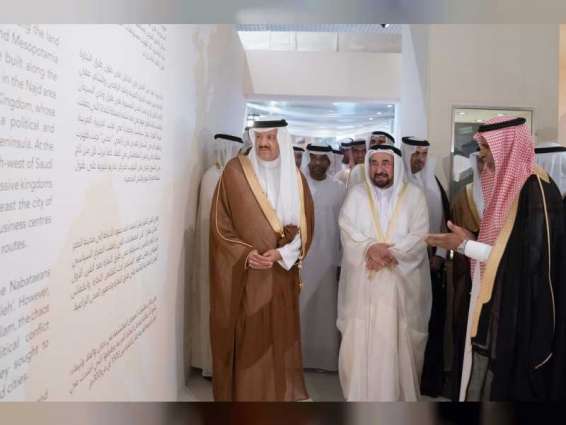SHARJAH, (Pakistan Point News - 17th Oct, 2018) H.H. Dr. Sheikh Sultan bin Mohammed Al Qasimi, Supreme Council Member and Ruler of Sharjah, and Prince Sultan bin Salman bin Abdul Aziz, President of the Saudi Commission for Tourism and National Heritage, inaugurated the ‘The Echo of Caravans: Pre-Islamic Civilisation Sites in Saudi Arabia’ exhibition at the Sharjah Archaeology Museum.
Opening Wednesday, the showcase stems from a collaborative partnership between the Sharjah Museums Authority and Saudi Commission for Tourism and National Heritage. The exhibition will run at Sharjah Archaeology Museum until 31st January 2019.
His Highness, the Ruler of Sharjah, and Prince Sultan bin Salman toured various sections of the exhibition, showcasing artefacts discovered in the Kingdom. Displayed for the first time to the public, the show reveals the historical traditions and customs common to the people of the Arabian Peninsula.
H.H. Dr. Sheikh Sultan bin Mohammed Al Qasimi said, "We welcome Prince Sultan bin Salman bin Abdul Aziz, who has honoured us with his knowledge and culture. In the history of the region in ancient times, in these moments, I have benefited a lot, and I hope to study everything that is showcased in this exhibition from a historical point of view."
Featuring a total of 50 unique archaeological artefacts, the exhibit highlights the cultural similarities, close societal bonds and shared customs and ideas that existed between the ancient communities of Arabia.
Through a complex and busy network of trade routes that crisscrossed the peninsula, people living in towns and villages throughout Arabia were able to communicate, barter and trade while also sharing knowledge of the latest tools as well as other tradable goods. This interaction took place long before the advent of currencies, coinage or transactions for monetary gain.
‘The Echo of Caravans: Pre-Islamic Civilization Sites in Saudi Arabia’ is a rare opportunity for members of the public to engage with artefacts from Saudi Arabia.
The 50 pieces were discovered at three locations; the cities of Najran, Al Ula, and Tayma. Each town was an important stopping-off point for travellers and traders leading caravans of camels loaded with frankincense, pottery and a host of other commodities across the Arabian Peninsula.
Caravans would visit Najran, in the south of the Arabian Peninsula, while on the road to the vital trade hub of Al Ula, with Tayma an important location to stop for travellers headed to Mesopotamia.
A total of six wonderfully preserved artefacts from Sharjah Archaeology Museum’s collection are displayed alongside objects from Saudi Arabia at 'Echo of Caravans'. Dating from the period of 1600 BC to 300AD, these artefacts were found at archaeological sites in Mleiha, Muwaileh and Jabal Al Buhais.
When displayed side by side, the artefacts from Saudi Arabia and Sharjah reveal that the people who lived across the peninsula shared a variety of similar customs, behaviours, and lifestyles and traded in a range of valuable objects including jewellery and more everyday goods such as cooking pots and lamps.
Visitors to Echo of Caravans will also experience small bronze statues of goats and camels, a sandstone altar with a bull’s head carved on one side, a bronze door key, incense burners, small busts and statues and a variety of ceramics.
Manal Ataya, Director-General of Sharjah Museums Authority, said that the exhibition paints a vivid picture of the ancient history of the Arabian Peninsula by carefully examining the artefacts that were important to the people, cultures and communities who lived here. "Despite the harshness of the environment and distances navigated, a vibrant and interconnected society flourished. The superb collection of the rare artefacts on display reveal a remarkable level of sophistication and craftsmanship and a thriving trade network that facilitated shared culture and knowledge," she added.




